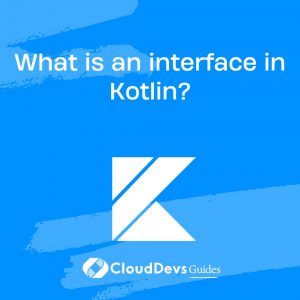What is an interface in Kotlin?
In Kotlin, an interface stands as a fundamental construct defining a contract for classes to adhere to, encapsulating a set of method declarations, property declarations, or abstract properties that classes must implement. Unlike concrete classes, interfaces solely focus on defining behaviors without specifying their implementation details, fostering code decoupling and enhancing code flexibility.
At its essence, an interface serves as a blueprint, outlining a collection of methods or properties that participating classes must provide implementations for. By establishing this contract, interfaces facilitate the implementation of polymorphism, enabling objects to be treated uniformly based on their shared interface, rather than their specific class type. This capability enhances code extensibility and maintainability, as new classes adhering to the interface can seamlessly integrate into existing codebases.
In Kotlin, interfaces can declare method signatures without providing method bodies, effectively defining a skeleton structure that implementing classes must fulfill. Additionally, interfaces can include property declarations, specifying abstract properties that implementing classes must define. These abstract properties lack backing fields, requiring implementing classes to provide their own storage mechanisms.
Furthermore, Kotlin interfaces offer the flexibility of including default implementations for methods, allowing for the specification of default behavior that implementing classes can choose to override if necessary. This feature streamlines the implementation process, providing sensible defaults for methods while still allowing for customization when required.
Unlike abstract classes, interfaces in Kotlin cannot contain state, meaning they cannot include properties with backing fields. Instead, interfaces focus solely on defining behaviors and method signatures, promoting a separation of concerns and enhancing code clarity.
By defining clear contracts through interfaces, Kotlin promotes code decoupling and abstraction, facilitating the development of modular and maintainable software systems. Interfaces enable developers to focus on defining behaviors and interactions at a higher level of abstraction, allowing for greater flexibility and adaptability in response to evolving requirements.
Interfaces in Kotlin serve as powerful tools for defining contracts and promoting polymorphism within codebases. They encapsulate behaviors and method signatures, facilitating code reuse and promoting loose coupling between components. With their ability to define default implementations and enforce method contracts, interfaces play a pivotal role in shaping the structure and extensibility of Kotlin applications.








